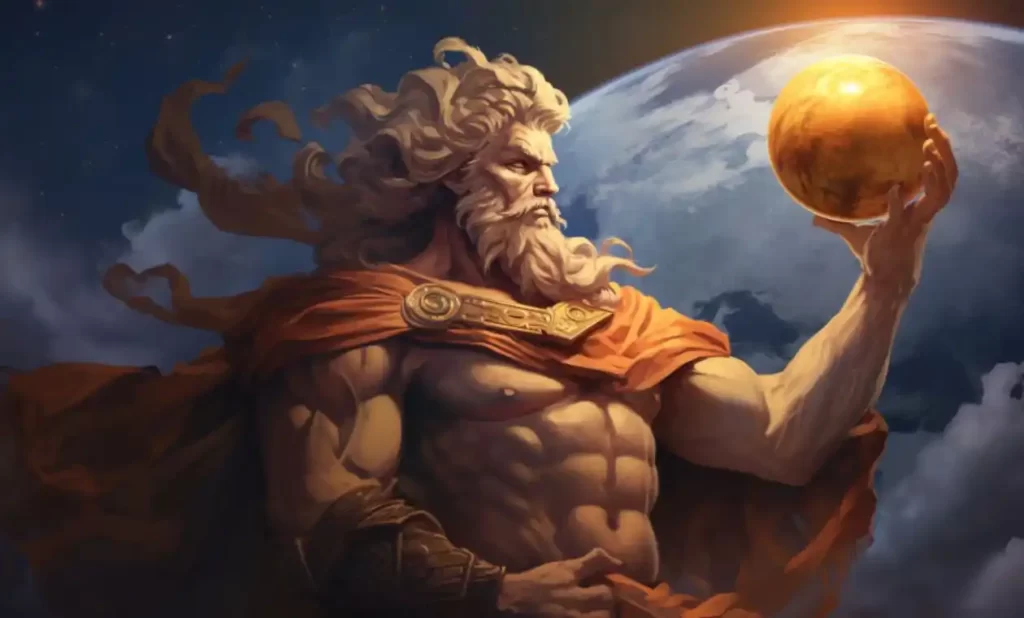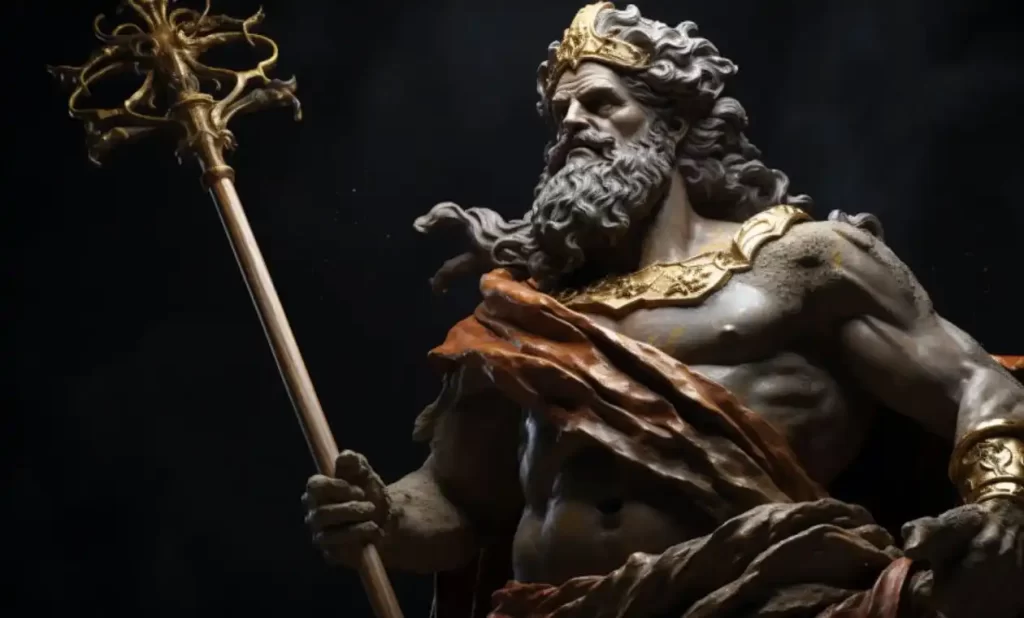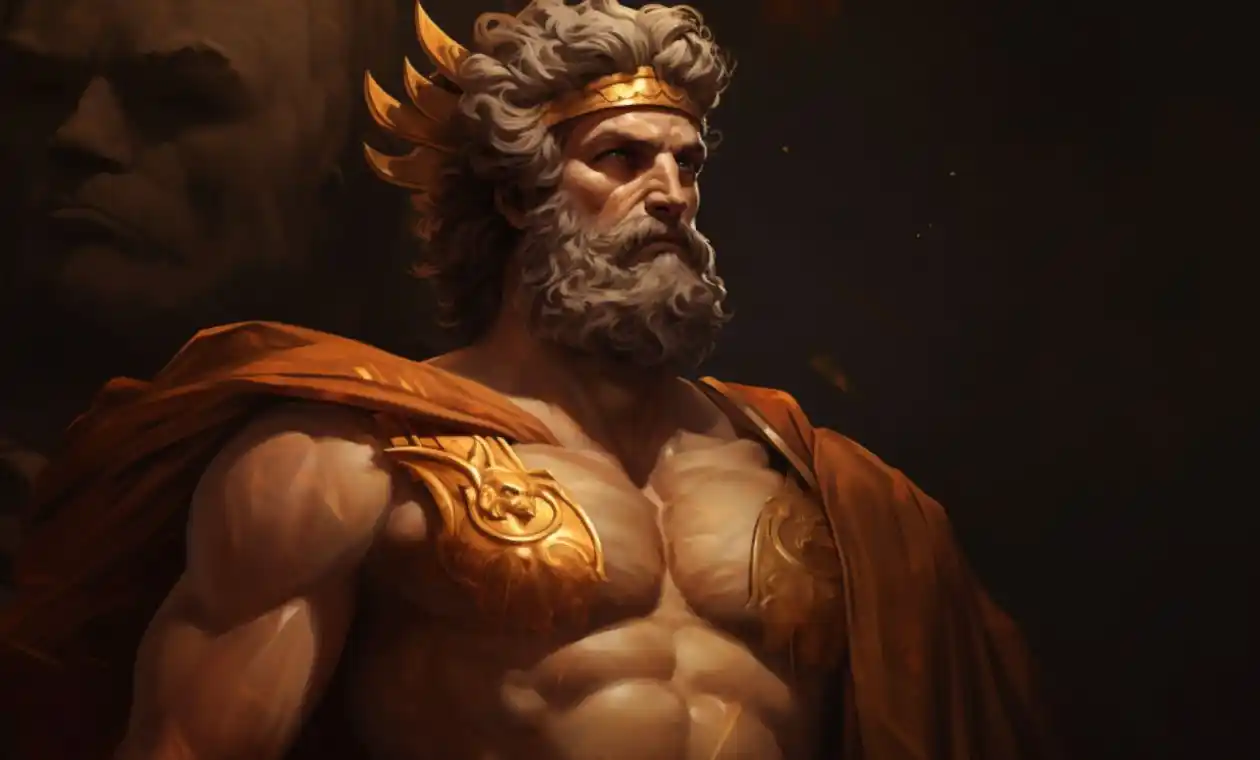
Pluto, a prominent deity in Roman mythology, holds a unique position as the god of the Underworld and wealth. In this article, we will explore the intriguing nature of Pluto and delve into his significant role within the Roman pantheon. By understanding his origins, symbolism, and mythological stories, we can unravel the captivating world of this enigmatic god and his profound influence on ancient Roman culture. Join us on this journey as we uncover the mysteries of Pluto, the ruler of the Underworld and the bringer of prosperity.
Origins and Symbolism of Pluto
Origins of Pluto and His Association with the Greek god Hades
Pluto, known as Dis Pater in Latin, shares a close association with the Greek god Hades. In Roman mythology, Pluto is considered an adaptation or equivalent of the Greek deity Hades.
The origins of Pluto can be traced back to ancient Etruscan mythology, where he was known as Aita. As the Romans came into contact with Greek culture, they adopted many of their gods and integrated them into their own pantheon. This led to the identification of Aita with Hades, the Greek god of the Underworld.
Pluto’s connection to Hades goes beyond their roles as rulers of the Underworld. Both deities were associated with the realm of the dead and presided over the afterlife. They governed the spirits of the departed and enforced the laws and punishments of the Underworld.
Interestingly, the name “Pluto” itself holds significant meaning. It is derived from the Greek word “Plouton,” which translates to “wealth” or “riches.” This association with wealth and abundance stems from the belief that the riches hidden within the Earth’s depths belonged to Pluto.
While Pluto and Hades share many similarities, there are some nuanced differences between them. Hades is often portrayed as a more somber and austere figure, while Pluto takes on a broader representation that includes wealth and prosperity.
The assimilation of Pluto into the Roman pantheon allowed the Romans to incorporate the Greek concepts of the Underworld and wealth into their own religious framework. This fusion of influences resulted in a distinct interpretation of the god, combining the attributes of both Hades and the Roman notion of prosperity.
Overall, Pluto’s association with the Greek god Hades showcases the interconnectedness of ancient mythologies and highlights the Romans’ ability to adapt and syncretize different deities to suit their beliefs and culture.
Symbolism Behind Pluto’s Name and its Connection to Wealth and the Underworld
Pluto’s name holds profound symbolism, representing both his dominion over the Underworld and his association with wealth and prosperity. The etymology of his name provides insights into these dual aspects of his character.
The name “Pluto” is derived from the Greek word “Plouton,” which translates to “wealth” or “riches.” This association with wealth stems from the belief that valuable resources and treasures lay hidden within the depths of the Earth, under Pluto’s dominion. As the god of wealth, he was believed to control the abundance and prosperity that lay beneath the surface.
The connection between Pluto’s name and the Underworld is equally significant. In ancient Roman and Greek mythology, the Underworld was a realm where souls of the deceased resided. It was a mysterious and dark place, ruled by Pluto and his Greek counterpart, Hades. The name “Pluto” is often linked to the Greek word “Ploutos,” which means “wealth,” emphasizing the association between wealth and the depths of the Earth, where the Underworld was believed to be located.
The symbolism behind Pluto’s name reflects the interconnectedness of wealth and the Underworld. It implies that the riches of the Earth are intimately connected to the realm of the dead. This connection can be interpreted in multiple ways. It signifies that wealth is transient and fleeting, much like life itself. It also suggests that wealth is buried deep within the Earth and must be sought after or earned.
Role and Domain
Pluto played several significant roles within Roman mythology, with his primary domain being the Underworld. Let’s explore his role as the ruler of the Underworld, his involvement in the afterlife, and his influence over earthly wealth and abundance.

Ruler of the Underworld and Judge of Souls:
Pluto’s foremost role was to govern the Underworld, a realm where souls journeyed after death. As the ruler, he presided over the fate of these souls and served as their judge. Upon death, souls were brought before Pluto to be assessed and assigned their appropriate place in the afterlife.
Pluto’s role as the judge of souls encompassed determining the rewards or punishments for the deeds done during a person’s earthly life. It was believed that he possessed knowledge of each soul’s actions, and he would dispense justice accordingly.
Involvement in the Afterlife and Control over the Realm of the Dead:
As the ruler of the Underworld, Pluto had control over all aspects of the afterlife. He established the laws and regulations governing the realm of the dead. This included maintaining order, enforcing punishments for wrongdoers, and ensuring the well-being of righteous souls.
Pluto’s realm comprised different sections, such as the Elysian Fields for the virtuous and the Fields of Punishment for the wicked. He oversaw the proper functioning of these areas and ensured that the souls were appropriately placed based on their life’s actions.
Influence over Earthly Wealth and Abundance:
Apart from his dominion over the Underworld, Pluto was also associated with wealth and abundance in the earthly realm. He was regarded as the god of riches due to the belief that valuable resources, such as precious metals and gems, originated from deep within the Earth, which was under his control.
Pluto’s connection to wealth extended beyond material riches. He was also seen as the bestower of agricultural fertility, responsible for the growth and prosperity of the land. The bountiful harvests and abundance of resources were considered blessings from Pluto.
In the eyes of the Romans, Pluto’s association with both the Underworld and wealth showcased his power over life and death, as well as his ability to bring forth prosperity. This perception solidified his position as a significant deity within the Roman pantheon.
Pluto nature and character
Pluto is one of the prominent Roman gods, renowned for his dual nature as the ruler of the Underworld and the god of wealth. In Roman mythology, he holds a significant position, governing the realm of the dead and acting as the judge of souls, determining their afterlife fate. As the ruler of the Underworld, he wields immense power and authority over the souls of the deceased.
Pluto’s association with wealth and abundance stems from the belief that valuable resources lie hidden within the Earth, which is under his dominion. He is considered the god of riches and prosperity, bestowing blessings upon those who revere him and seek his favor.
In Greek mythology, Pluto finds a parallel in the god Hades, as both share similar roles as the rulers of the Underworld. The name “Pluto” itself is derived from the Greek word “Plouton,” meaning “wealth,” further emphasizing the connection between wealth and the realm of the dead.
Mythological Stories and Depictions:
Pluto, as a prominent figure in Roman mythology, is associated with various captivating myths and stories. Let’s explore some popular tales featuring Pluto, his interactions with other gods and goddesses, and the artistic representations of him in ancient Roman art and literature.
1. The Abduction of Proserpina:
The story of the abduction of Proserpina is a well-known myth that showcases Pluto’s power and its connection to the changing seasons.
In this myth, Proserpina, the daughter of Ceres (Demeter), the goddess of agriculture and fertility, was enjoying a peaceful day, picking flowers in a meadow. Suddenly, Pluto, the god of the Underworld, emerged from the depths and became instantly infatuated with Proserpina’s beauty.
Seizing the opportunity, Pluto swooped down and forcefully abducted Proserpina, taking her with him to the Underworld. Ceres, devastated by the disappearance of her beloved daughter, searched frantically for her, causing the Earth’s fertility to wither and crops to die.
While in the Underworld, Proserpina was declared as Pluto’s queen. She was treated with respect and honor, but she longed to return to the world above and reunite with her mother. However, because Proserpina had consumed pomegranate seeds while in the Underworld, she became bound to it.
Eventually, a compromise was reached. It was decided that Proserpina would spend part of the year in the Underworld with Pluto and the remaining months with her mother on Earth. Her time in the Underworld corresponded with the barren winter months, and her return to Earth marked the arrival of spring and the revival of vegetation.
This myth serves to explain the cyclical nature of the seasons. Proserpina’s abduction symbolizes the descent of life into darkness and cold during the winter months, while her return to Earth represents the rebirth and renewal of nature in spring.
2. Interactions with Other Gods and Goddesses:
Pluto’s interactions with other gods and goddesses in Roman mythology emphasize his significance within the divine hierarchy and his influence over different realms and aspects of human experience.
One notable connection is with his brothers, Jupiter (Zeus) and Neptune (Poseidon). Together, they formed the ruling triumvirate of gods, with Jupiter as the king of the gods, Neptune as the god of the sea, and Pluto as the ruler of the Underworld. Their collaboration signifies the division of power among the three realms: the heavens, the sea, and the Underworld.
Pluto’s relations with other deities extend beyond his familial ties. In some versions of the myth, he is depicted as the husband of Proserpina (Persephone in Greek mythology). This association connects the Underworld with the realm of fertility and agriculture, as Proserpina is the goddess of spring growth and vegetation. It highlights Pluto’s role in the cycle of life and death, as well as the renewal of nature.
Additionally, Pluto shares a significant association with Mercury (Hermes). Both deities have a joint role as escorts of souls to the Underworld. Mercury guides the souls of the deceased from the mortal realm to the domain of Pluto. This partnership highlights the coordination and cooperation between different gods in their responsibilities related to the afterlife and the transition of souls.
These interactions and associations underscore Pluto’s essential position within the Roman pantheon. His collaborations with his brothers and his relationships with other deities demonstrate his influence over various aspects of human existence. As the ruler of the Underworld, Pluto holds sway over life, death, and the afterlife. His connection to Proserpina and Mercury further solidifies his role in the cycles of fertility, renewal, and the journey of souls.
3. Artistic Representations in Ancient Roman Art and Literature:
Pluto was a popular subject in ancient Roman art and literature. He was often depicted as a mature, bearded man, wearing a crown or helmet symbolizing his authority as the ruler of the Underworld. In some artistic representations, he is shown holding a scepter or a key, representing his power over life and death, and his control of the Underworld’s gates.
Literary works also portrayed Pluto in various ways. For example, in Virgil’s epic poem “Aeneid,” Pluto appears as a solemn and dignified deity, overseeing the Underworld and the fates of the souls within it. Other poets and writers often referenced Pluto’s role as the judge of souls and his connection to wealth and the Underworld.
These artistic depictions and literary references not only solidified Pluto’s presence in the cultural imagination but also provided visual and narrative interpretations of his character and domain.
Worship and Festivals:

The worship of Pluto in ancient Rome involved specific religious practices and rituals, as well as the observance of festivals dedicated to the god. Let’s explore these aspects of Pluto’s worship and the significance of festivals such as the Lemuria and Parentalia.
1. Religious Practices and Rituals:
The worship of Pluto typically involved offerings and sacrifices made to honor the god and seek his favor. Worshipers would present gifts such as food, wine, and flowers at altars or shrines dedicated to Pluto. These offerings were believed to please the god and ensure his benevolence.
Special prayers and invocations were recited during these rituals, with devotees expressing their reverence for Pluto and seeking his protection, guidance, or blessings. These religious practices aimed to maintain a harmonious relationship with the god and acknowledge his role as the ruler of the Underworld and the bestower of wealth.
2. Festivals Dedicated to Pluto:
a. Lemuria: The Lemuria festival was dedicated to appeasing the restless spirits of the deceased. It was celebrated on various days in May, particularly on May 9, 11, and 13. During this festival, household members would perform purification rites by walking barefoot throughout the house and making specific gestures to ward off malevolent spirits.
b. Parentalia: The Parentalia was a nine-day festival held in February to honor and commemorate ancestors. It was believed that during this time, the spirits of deceased family members would return to visit their living descendants. Offerings, including food, wine, and flowers, were made at family tombs and ancestral altars. The goal was to show respect and express gratitude to the ancestors, as well as to seek their continued protection and favor.
3. Significance of Festivals:
These festivals dedicated to Pluto served multiple purposes within Roman religious practices:
– Honoring the Underworld and the realm of the dead: The festivals recognized the importance of the Underworld in the cosmic order and acknowledged Pluto’s role as the ruler of this realm. They provided an opportunity for devotees to express their reverence for the god and offer prayers and offerings for the well-being of the deceased.
– Seeking favor and protection: The rituals and offerings made during these festivals were aimed at seeking Pluto’s favor, protection, and blessings. Devotees believed that by performing the prescribed rituals and showing respect to the dead, they could garner the goodwill of Pluto and gain his benevolent influence in their lives.
– Promoting family and ancestral bonds: The festivals, such as the Parentalia, fostered a sense of familial and ancestral connection. They provided occasions for families to come together, honor their ancestors, and reinforce family bonds. It was believed that by maintaining this connection and showing respect to the ancestors, individuals could draw upon their support and guidance.
Legacy and Influence:
Pluto, the Roman god of the Underworld and wealth, left a lasting legacy in Roman culture and society. His influence extended to various aspects, including art, literature, and religious practices. Additionally, his character has found adaptations and references in modern popular culture.
1. Legacy in Roman Culture and Society:
Pluto held a significant place in Roman religion and mythology. As the ruler of the Underworld and the god of wealth, he represented essential aspects of human life and the afterlife. His worship and festivals, such as the Lemuria and Parentalia, were deeply ingrained in Roman religious practices, providing a means to honor ancestors and seek divine protection.
The concept of Pluto as the god of riches and abundance resonated with Roman society, where wealth and prosperity were highly valued. As a result, Pluto’s influence extended beyond religious rituals and became a symbol of prosperity and the hidden wealth that lay beneath the Earth’s surface.
2. Influence in Art, Literature, and Religious Practices:
Pluto’s portrayal in ancient Roman art often depicted him as a powerful and regal figure, emphasizing his role as the ruler of the Underworld. These artistic representations contributed to the visualization of the god and reinforced his significance in the cultural imagination.
In literature, Pluto’s mythological stories, such as the abduction of Proserpina, served as popular and enduring themes. Writers and poets drew upon these narratives to explore themes of love, loss, and the cyclical nature of life and death. The significance of Pluto’s role in the afterlife and his interactions with other deities also found resonance in various literary works.
Moreover, religious practices associated with Pluto, such as offerings and prayers, influenced the daily lives of ancient Romans. These rituals provided a means for individuals to seek divine guidance, protection, and prosperity.
3. Modern References and Adaptations:
Pluto’s character and myths have found adaptations and references in modern popular culture. For instance, the concept of the Underworld, inspired by Pluto’s realm, appears in numerous contemporary books, movies, and video games. The idea of hidden treasures and untold wealth associated with Pluto has inspired modern storytelling and adventure themes.
In astrology, Pluto has a significant presence as one of the planets, influencing interpretations related to transformation, power, and regeneration.
Additionally, Pluto’s name continues to be referenced in various fields, such as scientific discoveries. The dwarf planet Pluto, discovered in 1930, was named after the Roman god, reflecting his enduring presence in human knowledge and exploration of the cosmos.
Conclusion
In conclusion, Pluto, the Roman god of the Underworld and wealth, stands as a compelling and influential figure in Roman mythology. With his dual nature as the ruler of the Underworld and the bestower of riches, Pluto embodies the complexities of life and death, prosperity, and the afterlife.
As one of the prominent Roman gods, Pluto holds a significant position in religious practices, art, and literature. His character has left a lasting legacy in Roman culture, where he is revered for his power and authority over the realm of the dead and his association with hidden earthly treasures.
Parallel to the Greek god Hades, Pluto’s presence in both Roman and Greek mythology underscores his enduring appeal and significance across different ancient civilizations.
From his mythological stories, such as the abduction of Proserpina, to his interactions with other gods and goddesses, Pluto’s influence extends to various aspects of human experience, including love, loss, and the cycle of seasons.
In modern times, Pluto’s character and concepts continue to find adaptation and reference in popular culture, serving as a testament to his enduring legacy.
Hey kids, how much did you like Pluto: The Roman God of the Underworld and Wealth? Please share your view in the comment box. Also, please share this story with your friends on social media so they can also enjoy it, and for more such Roman Mythology, please bookmark storiespub.com.
Related Article –
























